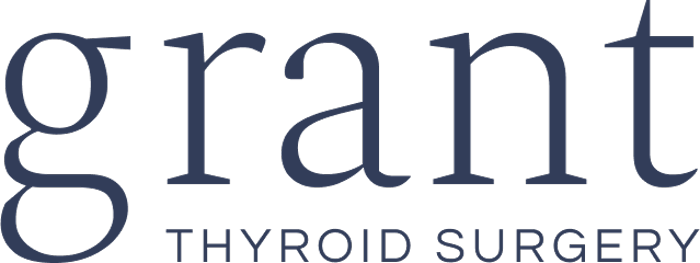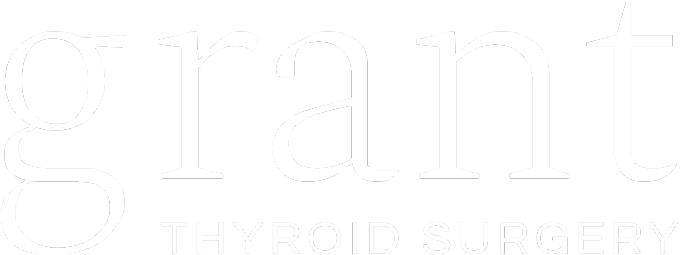Total thyroidectomy is a surgical procedure that removes the entire thyroid gland, often recommended for thyroid cancer, large goiters, or severe hyperthyroidism. Dr. David Grant, a fellowship-trained head and neck surgeon, offers thyroidectomy in Fayetteville with expert care and personalized treatment plans at Grant Thyroid Surgery to help restore your health.
What Is Total Thyroidectomy in Fayetteville?
Total thyroidectomy is the complete surgical removal of the thyroid gland. This procedure is commonly recommended for patients with thyroid cancer, multinodular goiter, or Graves’ disease that cannot be managed with medication or less extensive surgery. By removing the entire thyroid, the risk of recurrence is minimized, especially in cancer cases. After surgery, however, you will need lifelong thyroid hormone replacement to maintain normal metabolism.

Potential Reasons to Consider Total Thyroidectomy:
- Diagnosed with thyroid cancer requiring complete removal
- Presence of a large goiter causing compression or discomfort
- Recurrent thyroid nodules not suitable for partial surgery
- Graves’ disease not controlled by medication or radioactive iodine
- Suspicious or indeterminate nodules with high cancer risk
- Genetic predisposition to thyroid cancer (e.g., RET mutation)
- Persistent hyperthyroidism unresponsive to other treatments
- Reoperation risk with partial thyroidectomy considered too high
Prevent Future Thyroid Complications
Dr. Grant always aims to preserve as much healthy thyroid tissue as possible, often recommending less invasive options like a hemi-thyroidectomy when appropriate. However, in certain cases—such as confirmed thyroid cancer, diffuse disease, or high recurrence risk—a total thyroidectomy is the safer long-term solution. By removing the entire gland, the risk of residual disease, recurrent nodules, or future surgeries is significantly reduced. This approach helps prevent complications down the line and offers a more definitive treatment.
Benefits of Total Thyroidectomy:
- Removes all thyroid tissue to minimize cancer recurrence risk
- Eliminates the need for future thyroid surgeries
- Allows for easier monitoring with thyroglobulin as a tumor marker
- Reduces the chance of regrowth in multinodular goiter
- Prevents continued overproduction of thyroid hormones in Graves’ disease
- Provides a definitive treatment when partial removal is insufficient
- Enables precise radioactive iodine therapy if needed postoperatively
- Simplifies long-term management with consistent thyroid hormone replacement

How Is Total Thyroidectomy Done?
During a thyroidectomy in Fayetteville, you’ll receive general anesthesia to ensure you’re fully asleep. Dr. Grant makes a small incision at the base of your neck to expose the thyroid gland. Using advanced techniques, he removes the entire thyroid while preserving vital structures such as the parathyroid glands and recurrent laryngeal nerves. The incision is then closed with fine sutures to minimize scarring. The procedure typically takes a few hours, and you’ll be closely monitored afterward to ensure a safe, smooth recovery.
Recovery After Total Thyroidectomy
After your total thyroidectomy, you’ll spend a short time in recovery and may go home the same day or after an overnight stay. You can expect mild soreness and a temporary sore throat, which usually improves within a few days. Dr. Grant will monitor your calcium levels and start you on thyroid hormone replacement to maintain normal metabolism. Most patients return to light activities within a week. You’ll receive detailed instructions and follow-up care to ensure a smooth recovery and long-term success following your surgery.
Total Thyroidectomy FAQs
Will I Need to Take Medication After a Total Thyroidectomy?
Yes. After your thyroid gland is removed, your body can no longer produce thyroid hormones naturally. You must take daily thyroid hormone replacement therapy—usually levothyroxine—to maintain normal metabolism, energy levels, and organ function. Dr. Grant will tailor your dosage to your specific needs through careful monitoring and follow-up blood tests.
What Are the Risks of Total Thyroidectomy?
Like any surgery, total thyroidectomy carries some risks. These include bleeding, infection, hoarseness from temporary or (rarely) permanent vocal cord nerve injury, and low calcium levels due to disturbance of the parathyroid glands. Dr. Grant takes every precaution to minimize these risks using meticulous surgical techniques.
Will I Have a Scar?
Yes, but Dr. Grant places the incision in a natural skin crease at the base of your neck to minimize visibility. Over time, most scars fade significantly and become barely noticeable.

Schedule Your Consultation With Dr. Grant
Dr. David Grant is a fellowship-trained head and neck surgeon with advanced expertise in thyroid and parathyroid surgery. At Grant Thyroid Surgery, every step of your journey—from diagnosis to recovery—is carefully coordinated to ensure a seamless experience. If you’ve been diagnosed with thyroid cancer, a large goiter, or another condition requiring thyroidectomy in Fayetteville, trust Dr. Grant to provide expert care. Schedule your consultation today to discuss your treatment options with Dr. Grant.

